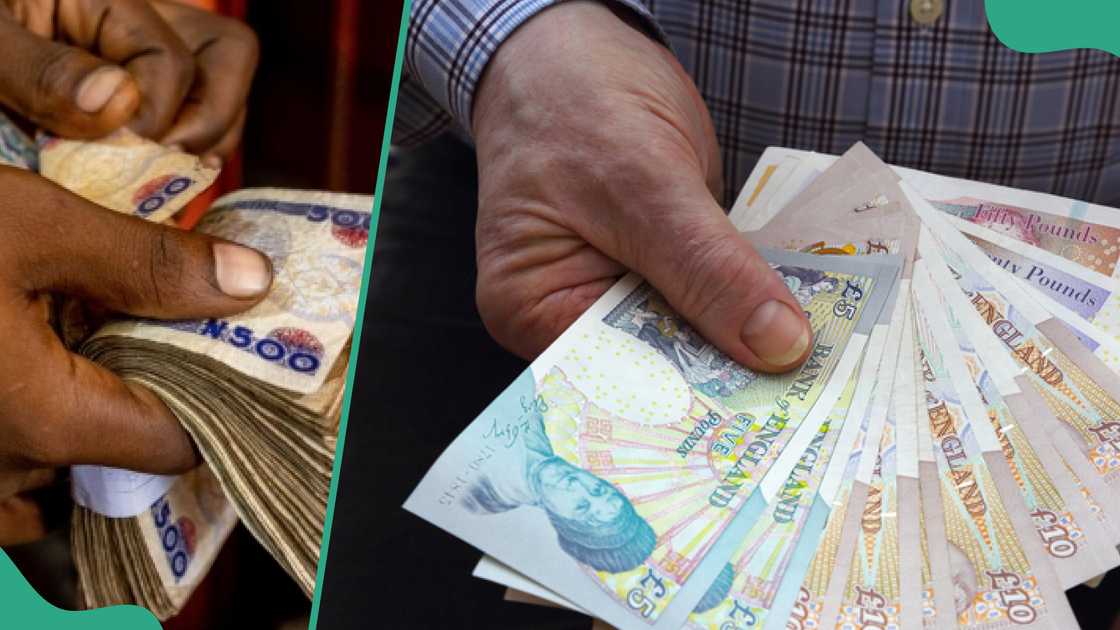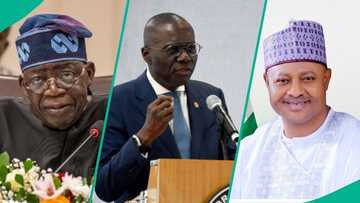Traders Sell Naira at New Price Against British Pound as Demand Pressure Heightens
- Tuesday's unofficial market saw the naira close at about N2,177 to the British pound
- The value of the Nigerian currency varied between N2,100 to N2,180/£ over the month of April
- This is because the British pound sterling is under more buying pressure on the global market
Don't miss out! Join Legit.ng's Sports News channel on WhatsApp now!
Legit.ng journalist Zainab Iwayemi has 5-year-experience covering the Economy, Technology, and Capital Market.
In the unofficial market on Tuesday, the value of the naira closed around N2,177 per British pound.

Source: UGC
During the month of April, the Nigerian currency fluctuated between N2,100 and N2,180/£ due to heightened purchasing pressure on the British pound sterling on the international market
Nigeria ranks 38th among the UK’s commercial partners, whereas the UK is Nigeria’s second-largest trading partner.
Markets forecast that foreign investors will play a crucial influence in determining the stability of the Nigerian naira in 2025.
According to Central Bank of Nigeria (CBN) data, the UK accounts for 50% of remittances sent by Nigerians abroad. In 2024, remittances are predicted to increase by 9% to $21 billion.
Due to historical ties, time zone alignment, shorter travel lengths than the US and Canada, and the lack of language obstacles, the UK continues to be a popular destination for many young Nigerians.
Following recent U.S. government pronouncements on Liberation Day, the UBS Group AG updated its prediction for the GBP/USD pair, pointing to increases in the pound and a declining U.S. dollar.
The Swiss bank said in a letter issued by its Chief Investment Office that it now anticipates the GBP/USD exchange rate to hit 1.39 by the end of March 2026.
Although the British pound is not yet categorized as a safe-haven currency, UBS pointed out that its liquidity and potential for carry trade tactics have made it more appealing.
The pound also strengthened as a result of the UK's exclusion from Donald Trump's lists of punitive tariffs. Instead of specific supplementary tariffs, the UK was only liable to a universal charge of 10%.
Future trade accords may benefit from the UK's diplomatic strategy of avoiding significant retaliation actions.
Additionally, UBS warned that a global recession might put pressure on the pound because the UK's trade-dependent economy is still fragile.
The pound, like the euro, exhibited haven-like behavior during the recent dollar sell-off, despite not being officially recognized as a haven currency.
UBS emphasized the pound's relative volatility in comparison to the euro, citing low rates on both currencies as a result of continued geopolitical concerns as one factor.

Source: UGC
ChannelsTV reported that due to the ongoing uncertainty around a possible de-escalation in the Sino-US trade dispute, the dollar found it difficult to rebound from Tuesday's large losses.
While former President Trump claimed that progress had been achieved and confirmed conversation with Chinese President Xi Jinping, Beijing refuted these allegations.
Due to the uncertainty, investors kept dumping the dollar, which had dropped precipitously against safe-haven currencies like the Swiss franc and the yen in the previous session.
Both the United States and China seem to have loosened their positions recently, despite the lack of hard proof of a trade breakthrough.
China spared certain U.S. imports from its 125% tariff regime, while the Trump administration indicated an interest in lowering duties.
As investors increasingly turn to European assets, the euro dropped 0.15% to $1.14, although it is still on course for its biggest monthly gain against the dollar in over 15 years. At $1.34, the British pound was trading close to a three-year high.
CBN urgently releases $197 milion into forex market
Legit.ng reported that to maintain sufficient liquidity and stabilise trading, the Central Bank of Nigeria (CBN) invested US$197.71 million in the foreign currency (FX) market on Friday, April 4.
The CBN director of the Financial Markets Department, Omolara Duke, stated in a weekend circular that the transfer was made through sales to authorised dealers.
The action, according to Duke, addressed the growing volatility in international financial markets. This came after the United States slapped fresh import duties on a number of economies.
PAY ATTENTION: Сheck out news that is picked exactly for YOU ➡️ find the “Recommended for you” block on the home page and enjoy!
Source: Legit.ng






